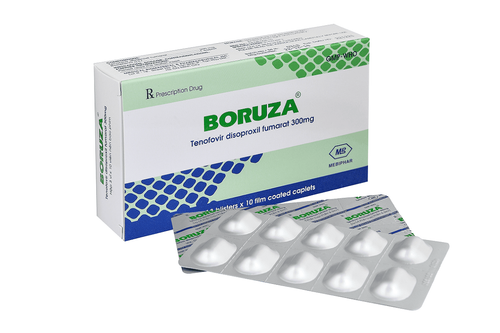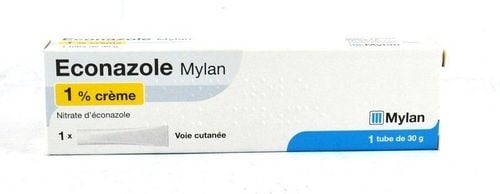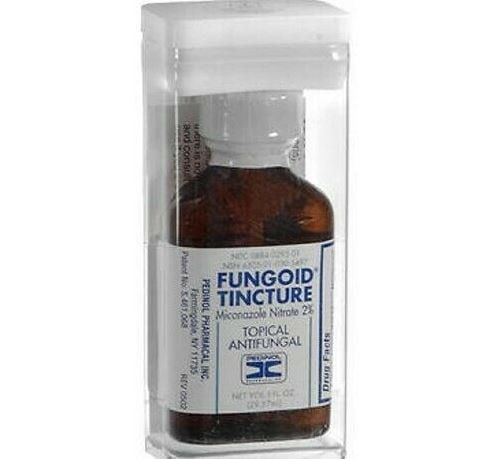This is an automatically translated article.
Bikozol is a broad-spectrum antifungal drug, used in the treatment of many different types of fungi, from ringworm, mucous membrane to visceral fungus. Low doses of Bikozol have a bacteriostatic effect, while high doses have a bactericidal effect.
1. Uses of Bikozole
Bikozol is a broad-spectrum antifungal drug, effective on many different types of fungi, from superficial and mucosal fungi to visceral fungi. In addition, it is active against some gram-positive bacteria. Bikozol has an antifungal effect due to its ability to inhibit the enzyme alfa demethylase (the enzyme involved in the synthesis of ergosterol). Thereby changing the permeability of the cell membrane, inhibiting membrane function and growth of fungi. Using low dose Bikozol has fungicidal effect, high dose has fungicidal effect.
2. Indications for the use of Bikozole
Bikozol is indicated in the treatment of many different types of fungus, specifically:
Skin, hair and nail fungus caused by ringworm or yeast but cannot be treated locally due to the location and spread of the affected skin. fungal infections, due to fungal infections deep in the skin, or unresponsive to topical treatment. For example, onychomycosis, candida, ringworm, scalp fungus, pityrosporum, etc. Gastrointestinal candidiasis Recurrent vaginal candidiasis unresponsive to topical therapy Visceral candidiasis, such as visceral candidiasis, paracoccidioides, histoplasma, coccidioides, blastomyces Prophylactic use in immunocompromised individuals at risk of fungal infections Bikozol is not used in the treatment of fungal meningitis, because it does not penetrate well into the central nervous system.
3. Dosage, how to use Bikozole
Skin cream: Apply to the infected skin area 1-2 times / day for a continuous period of 2-4 weeks, severe can last up to 6 weeks. Patients should be treated for enough time to completely eradicate the fungus, at least a few days after the symptoms disappear. At the same time, identify the source of infection, clean and avoid re-infection.
Tablets: Bikozol should be taken with meals for maximum absorption.
For adults with fungal skin infections, gastrointestinal and visceral fungal infections, take 1 tablet (200 mg)/time/day with meals; If no response to treatment can be increased to 2 tablets (400mg) / time / day with meals. For people with vaginal candidiasis, take 2 tablets (400mg) / time / day with meals. For children weighing 15-30kg, take 100mg/time/day with meals. For children weighing over 30 kg, use the same dose as adults. Administration should continue until at least 1 week after symptoms have completely disappeared and cultures have turned negative.
Prophylactic dose for immunocompromised people is 2 tablets (400mg)/day for adults, 4-8mg/kg/day for children, the duration of treatment is usually 5 days in the prevention of vaginal candidiasis, 4 weeks for ringworm, 10 days for ringworm, 2-3 weeks for oral and candidiasis, 1-2 months for hairy, 6-12 months for onychomycosis, 1-2 months with visceral candidiasis, 3-6 months with paracoccidioides, histoplasma, coccidioides: the optimal duration of treatment is 3-6 months.
4. Contraindications Bikozole
Bikozol is contraindicated in the following cases:
People with hypersensitivity to Bikozol drug components People with acute or chronic liver disease People who are using drugs like terfenadine, astemizole, cisapride, triazolam, oral midazolam, quinidine, pimozide, an inhibitor of HMG-CoA reductase metabolised by CYP3A4 such as simvastatine and lovastatin. If combined with topical corticosteroids, it is necessary to use mild corticosteroids applied in the morning and apply Bikozol in the evening, gradually reducing the amount of corticosteroids and stopping completely in 2-3 weeks. Note, the drug is not used for eye drops, because the medicine contains propylene glycol which can cause swelling of the skin. In addition, it contains methyl parahydroxybenzoate which may cause allergic reactions.
5. Bikozole side effects
Common side effects when using Bikozol include gastrointestinal upset reactions, nausea, abdominal pain, diarrhea. In addition, it causes some less common side effects including headache, reversible elevation of liver enzymes, menstrual disorders, dizziness, photophobia, paresthesia and allergic reactions. Some uncommon side effects include thrombocytopenia, male pattern baldness (alopecia), hypophysiology, and reversible increase in intracranial pressure (papilloedema, bulging fontanelle in infants). At doses of 200 mg and 400 mg daily, reversible gynecomastia and spermatogenesis, transient decrease in plasma testosterone levels, hepatitis, which is usually reversible upon immediate discontinuation of the drug.
Bikozol is a broad-spectrum antifungal drug, used in the treatment of many different types of fungi, from ringworm, mucous membrane to visceral fungus. Using the drug exactly as prescribed brings high efficiency and avoids unwanted side effects.
Follow Vinmec International General Hospital website to get more health, nutrition and beauty information to protect the health of yourself and your loved ones in your family.
Please dial HOTLINE for more information or register for an appointment HERE. Download MyVinmec app to make appointments faster and to manage your bookings easily.













